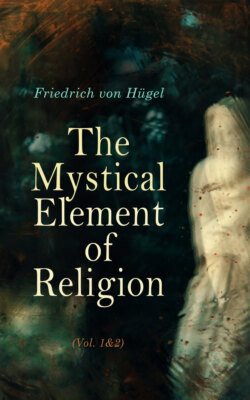Читать книгу The Mystical Element of Religion (Vol. 1&2) - Friedrich von Hügel - Страница 100
На сайте Литреса книга снята с продажи.
1. The facts.
ОглавлениеThis peculiarity has already appeared in part in the second of the two accounts as to her attitude towards Indulgences. “She abstained from recommending herself to the intercession of others.” And this is borne out, but (as we shall find) with certain unforeseeable restrictions, by the rest of the Vita. As regards even the Saints, one only invocation of any one of them is on record,—that of St. Benedict in 1474, already given.
And if she did not ask others for prayers for herself in her own lifetime, her own prayers for others were evidently rare, were apparently always concerned with their spiritual welfare, and were generally produced only under some special interior impulsion. Hence when asked, in 1496 or later, by Vernazza, in the name of several of her spiritual children, to pray that God might grant them “some little drops of His Love,” she answers that “for these I cannot ask anything from this tender Love; I can but present them in His presence.” This is, no doubt, because she sees them to be already full of the love of God. Whereas in 1495 the poor working man, Marco del Sale, is dying of a cancer in the face, and is in a state of wild impatience: so she prays most fervently for him. It is true that the Vita adds that she did so, “having had an interior movement to this effect. For she never could turn to pray for a particular object, unless she had first felt herself called interiorly by her Love.” Still, this did not prevent her, in 1497, from praying most fervently for patience for her husband, (who was dying from a painful complaint,) simply “because she feared that he might lose his soul,” and without any other more peculiar incentive than this.[78]
